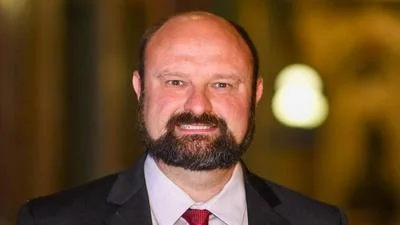Mark "Markie" Cervantes, Cultivation Manager for Progressive Treatment Solutions (PTS) in East St. Louis. | LinkedIn / Mark "Markie" Cervantes
Mark "Markie" Cervantes, Cultivation Manager for Progressive Treatment Solutions (PTS) in East St. Louis. | LinkedIn / Mark "Markie" Cervantes
A former employee of Progressive Treatment Solutions (PTS), one of the largest cannabis companies in Illinois, is blowing the whistle on alleged predatory labor practices facilitated by a questionable union and alleged ties to organized crime.
The anonymous source, who worked at PTS's production facility, shared details about low wages, manipulative labor contracts, and a safety cover-up.
The worker claims PTS, along with the Chicago-based ProTech Local 33 union, is pushing exploitative labor agreements that lock employees into stagnant wages for years, all while claiming to help minority communities.
"They're using these cannabis unions in Illinois to keep wages low," the former employee told the Metro East Sun. "They come in offering a dollar raise and try to get everyone to sign with the union. But they rely on people not paying attention to what they're signing. They offer the dollar raise, then lock in wages for 3 or 4 years at a time. There are no raises for minimum wage increases, no cost of living adjustments—none of that is factored in."
The worker, who was reportedly involved in production at PTS's facility, provided a stark example of how this system works in practice.
"My team, out of five teams, was producing about 2,200 pounds of finished product a month, and they were paying people just $17 an hour,” the source said. “Does that paint a picture for you?"
Those 2,200 pounds per month were worth $4 million, the source said.
According to the whistleblower, PTS's situation is exacerbated by its reliance on minority communities.
"They're relying on these communities to accept low wages,” the source said. “They tell people, 'Hey, look, we’re bringing in jobs,' when in reality, they’re just locking in low wages for years."
In addition to these labor practices, the worker claims PTS uses a complex business structure to bypass licensing restrictions.
"They have a production facility in East St. Louis,” the source said. “They operate under a couple of different names. In Illinois, I can't get a license to work at a dispensary for part-time money. But these cultivation facilities will open cultivation sites and then open dispensaries under sister names. So, Peters is the cultivation facility, and then 'Consumers' is their dispensary, and they have five or six brands under each of those."
But it’s not just the wages and business structure that raise concerns.
The worker also pointed to the union involved: ProTech Local 33, which is allegedly tied to the Senese crime family in Chicago.
"ProTech Local 33 is part of the National Production Workers Union, based in Chicago,” the source said. “The guy who founded the union was a known mobster who, I believe, was killed publicly. His son now runs the union, and he’s written a book about it. These are very public ties to organized crime, but no one’s really talking about it.”
ProTech Local 33 has been accused of acting as a "yellow" union, a company-friendly group that undermines workers' rights and is often used by employers to avoid real union representation.
The National Production Workers' Union (NPWU), which ProTech is affiliated with, has a long history of corruption linked to the Chicago labor scene, especially through the Senese family.
Dominic Senese, a former Teamsters official, was deeply involved with organized crime and was the target of a mafia assassination attempt in 1988. After his removal from leadership in the 1990s, his family continued to run NPWU, which was involved in illegal financial practices and union raids.
NPWU has also been known for using tactics to bypass real union organizing, such as breaking strikes and imposing questionable contracts.
For the whistleblower, the situation is personal.
"I’m a proud union person,” the source said. “When I heard I was getting into the union scene, I saw the big guys—who wouldn't hire us 10, 15 years ago—snatching up the industry. We’re just trying to stop them from doing that."
The employee also pointed to an alarming safety incident the company and union allegedly worked together to conceal.
"One of the employees accidentally mixed bleach with nutrients while cleaning,” the source said. “It created toxic gas, and we worked in it for hours. I gave the company a chance to respond appropriately, but they never did. So, I filed a complaint with OSHA and left it to them, but nothing came of it.”
Despite these hazardous conditions, the whistleblower says the company continues to operate unchecked.
"The state was coming down on the facility with fines left and right, so we started stepping up, cleaning everything. One of the younger guys was washing a table and accidentally rinsed bleach down with the nutrient solution. It created toxic gas, but the company didn’t act. They just swept it under the rug."
Despite leaving the company in September 2024, the former employee says the situation at PTS hasn’t improved.
"I’ve heard they’re still requesting the same safety training I pushed for when I was there,” the source said. “It's been months, and nothing’s changed."
For PTS, the allegations of mob ties, unsafe working conditions, and exploitative labor practices paint a grim picture.
The former employee, though anonymous, hopes that by sharing his story, change can come.
"People need to know what’s going on behind the scenes,” the source said. “This needs to stop before it gets worse."
The worker hopes his revelations will help expose what he sees as a systemic problem within Illinois’s cannabis industry, particularly with the involvement of figures like Governor J.B. Pritzker.
"Pritzker is a major player in the Democratic Party, and if this is his 'golden egg'—his little pet project—then it needs to be exposed,” the source said. “It’s all disguised, essentially. They manipulate things in their favor."
Pritzker has been under fire before for his treatment of the cannabis industry.
In 2022, Pritzker–who has not been shy in his pursuit of higher office–faced criticism for failing to fulfill his promise of diversifying Illinois' cannabis industry, with only one minority-owned license granted out of over 340 issued since 2020.
Critics, including former Democratic gubernatorial candidate Beverly Miles, accused Pritzker of lying to marginalized communities, particularly Black voters, about economic opportunities in the cannabis industry.






 Alerts Sign-up
Alerts Sign-up